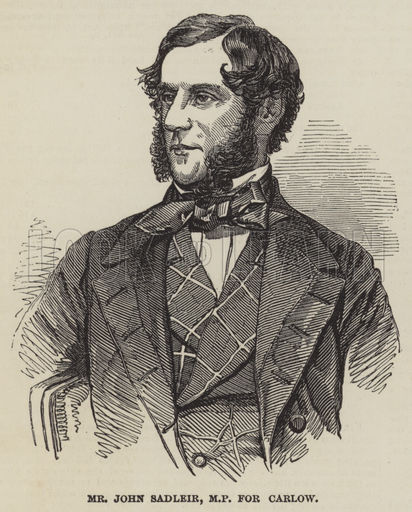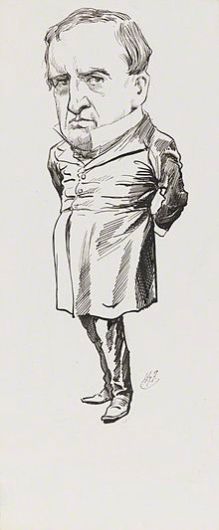

Today the story of an Irish political party dedicated to the interests of large, comfortable and respectable farmers – but enough about Fine Gael, coincidentally founded eighty-four years ago today. Instead the story of an Irish political party dedicated to the interests of large, comfortable and respectable farmers. Turns out we’ve had quite a few over the years.
The Irish Tenant League was the posh cousin of the Land League of the 1880s. Someone like Michael Davitt would never have been allowed near the Tenant League. He was far too working class. But the League made the 1850s more interesting in Ireland than the decade might otherwise have been, and regularly rattled the cage of the British government, before sliding into the inevitable abyss of corruption and recrimination.
The League was established in 1850s in the wake of the Great Famine. Under the terms of the Encumbered Estates Acts a number of vulture funds were buying up distressed properties. Sorry, that’s actually more recent. Let me rephrase. A number of wealthy capitalists were acquiring bankrupt estates at knockdown prices and threatening to change the rules for sitting tenants. That’s the great thing about history. If you stick around for long enough it just keeps happening all over again.
The leading lights of the new organisation were Charles Gavan Duffy, the former Young Irelander, and the English-born journalist Frederick Lucas, editor of the progressive Catholic weekly newspaper, The Tablet.
It was the Tenant League, not its more illustrious and egalitarian successor, which came up with the three famous demands of the Irish agrarian movement, the ‘3 F’s’, dreaded by every student of Irish history. You could easily recall two, but damned if you could ever remember the third. For the record, they were ‘Fair rent, free sale and … em … em …yes, fixity of tenure.’
The organisation of the League’s activities fell to another former Young Irelander, Newry-born John Martin, who would later precede Charles Stewart Parnell as MP for Meath. The League attracted the support of the rump of the late Daniel O’Connell’s Repeal Party in the House of Commons, and in 1852 managed to return fifty Tenant Right candidates to parliament. These included Gavan, Duffy, Lucas, the banker John Sadlier from Tipperary, and the lawyer William Keogh, MP for Athlone. The Tenant League MPs were pledged not to align themselves with any British party which failed to endorse the ‘3 Fs’, and to refuse all political preferment.
Of course, it quickly went pear-shaped. A sectarian element intervened when a cohort of Tenant Leaguers decided that the cause of Catholic religious rights was more important than forcing agrarian reform. They broke off to form the Catholic Defence Association, nicknamed ‘The Pope’s Brass Band’. In response Frederick Lucas ill-advisedly took on the powerful Roman Catholic Cardinal-Archbishop of Dublin, Paul Cullen, and lost. Lucas died in October 1855, and the following month Gavan Duffy emigrated to Australia, where he became Prime Minister of the state of Victoria.
But it got even worse than that. Defying the pledge to remain aloof from political office, Sadleir and Keogh accepted positions in Lord Aberdeen’s coalition government, and joined that great anti-pantheon of Irish traitors whom we cherish to this day. Sadlier didn’t last long in office, he was gone by 1854, forced to resign when he was found guilty of trying to bring about the imprisonment of one of his bank’s customers. This errant depositor had failed to deliver on a promise to vote for Sadleir. Two years later his Tipperary Bank went spectacularly bust and he committed suicide by drinking prussic acid.
It would be nice to report a similar fate for Keogh, instead he became a judge and handed down savage sentences to the Fenian leadership in 1867. It was left to William Gladstone, through his land legislation of 1870, and Davitt’s Land League of the 1880s, to bring into effect the principles of fair rent, free sale and … the other one.
A Dublin conference of the Irish Tenant League adopted an ill-starred policy of independent opposition in Parliament, one hundred and sixty-five years ago, on this day.
You must be logged in to post a comment.